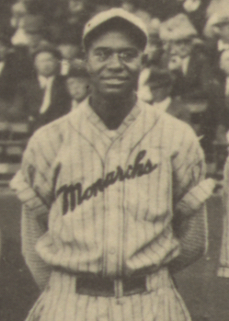Frank Duncan (catcher) facts for kids
Quick facts for kids Frank Duncan |
|||
|---|---|---|---|

Duncan at the 1924 Colored World Series
|
|||
| Catcher | |||
| Born: February 14, 1901 Kansas City, Missouri |
|||
| Died: December 4, 1973 (aged 72) Kansas City, Missouri |
|||
|
|||
| Career statistics | |||
| Batting average | .257 | ||
| Runs batted in | 336 | ||
| Hits | 684 | ||
| Managerial record | 281–212–7 | ||
| Winning percentage | .570 | ||
| Teams | |||
As player
As manager
|
|||
| Career highlights and awards | |||
|
|||
Frank Lee Duncan Jr (born February 14, 1901 – died December 4, 1973) was an important baseball player and manager in the Negro leagues. He played from 1920 to 1948. Frank Duncan was mostly known as a catcher for the Kansas City Monarchs. He helped guide their pitchers for more than ten years.
Even while playing part-time, he managed the Monarchs to win two league championships in 1942 and 1946. He managed the Monarchs longer than anyone else in the team's history, winning 281 games. This was a club record. He also caught two special games called no-hitters with the Monarchs, one in 1923 and another in 1929.
Contents
Playing Career Highlights
Frank Duncan started his baseball career with the Chicago Giants in 1920. In 1921, he joined the Kansas City Monarchs. He quickly became a key player for the team. In 1922, he was a top catcher in the Negro National League. He led all catchers in how well they fielded the ball and in assists.
In 1923, Duncan helped the Monarchs win their league championship. That winter, he played in the famous Cuban Winter League for the Santa Clara Leopardos. His team won the championship with an amazing record of 36 wins and only 11 losses.
World Series and Key Moments
In 1924, Duncan helped the Monarchs win another championship. They then won the 1924 Colored World Series. Even though his batting average was low in that series, he had a huge moment in Game Eight. He hit a single that brought in the tying and winning runs in a dramatic comeback victory. This play was very memorable because it happened after a famous catcher dropped a foul ball from Duncan.
In 1925, Duncan continued to play for the Monarchs. He had another big moment in the 1925 Negro World Series. He made a great tag at home plate in the 11th inning of Game One. In 1926, during a game, he was hurt when he collided with another player and was accidentally hit.
Travel and Later Years
In 1927, Duncan had a fantastic year, hitting very well. That year, he also went on a memorable trip to Japan with other Negro league players. They played many games and won almost all of them. The trip also included stops in Hawaii, China, Russia, and the Philippines.
He continued to play for several years, showing strong batting skills in 1929 and 1930. In 1931, he played for the Pittsburgh Crawfords. Later, he played for the New York Cubans and returned to the Kansas City Monarchs in 1937.
In 1938, Duncan played for both Kansas City and Chicago. He led the Negro American League in triples that year. He also played in the 1938 East-West Game, which was a special All-Star game for Negro league players.
Managerial Career
In 1942, Frank Duncan became the player-manager for the Kansas City Monarchs. This meant he played on the team while also being their coach. He led them to win the league title. Then, they won the 1942 Negro World Series, beating the Homestead Grays in a clean sweep.
After the 1942 season, Duncan joined the United States Army to serve in World War II. He was a very skilled marksman, hitting almost every target perfectly. He was honorably discharged (meaning he left the army with good standing) early in 1943. He quickly returned to manage the Monarchs for the rest of the season.
In 1944, the Monarchs had a tough year because many of their best players were away fighting in the war. The next season, in 1945, Duncan became Jackie Robinson's first professional manager. Jackie Robinson would later break the color barrier in Major League Baseball.
Duncan led Kansas City to the 1946 Negro World Series again. They played a tough series but lost to the Newark Eagles. He stopped managing after the 1947 season, and Buck O'Neil took over. After leaving baseball, Frank Duncan worked as an umpire in the Negro American League and also ran a business.
Personal Life
Frank Duncan was married to the famous blues singer Julia Lee. She often performed in clubs where only white people were allowed. To see her perform, Duncan would sit with the band and pretend to be a musician.
In 1941, Frank Duncan played alongside his son, Frank Duncan III, who was a pitcher. They are believed to be the first father-son battery (meaning a pitcher and catcher pair) in professional baseball history.

